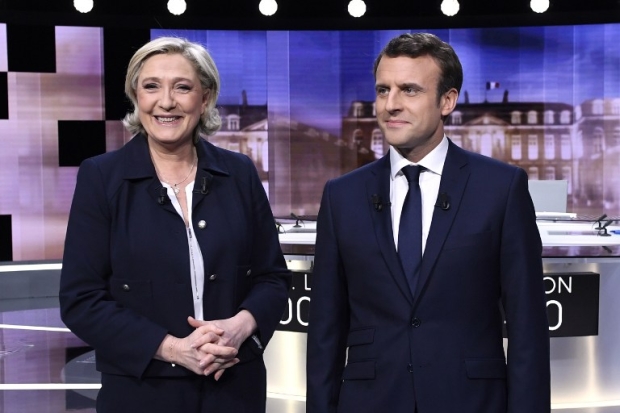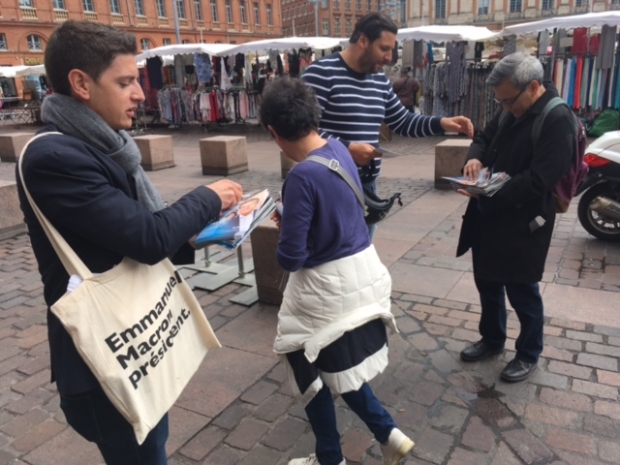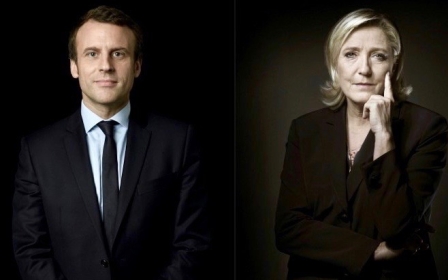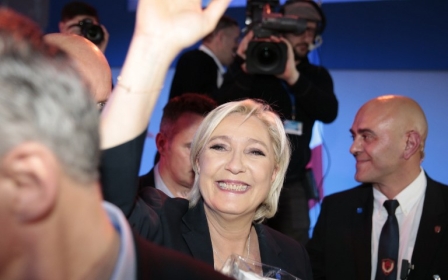French election: Le Pen down but not out as final battle for presidency looms
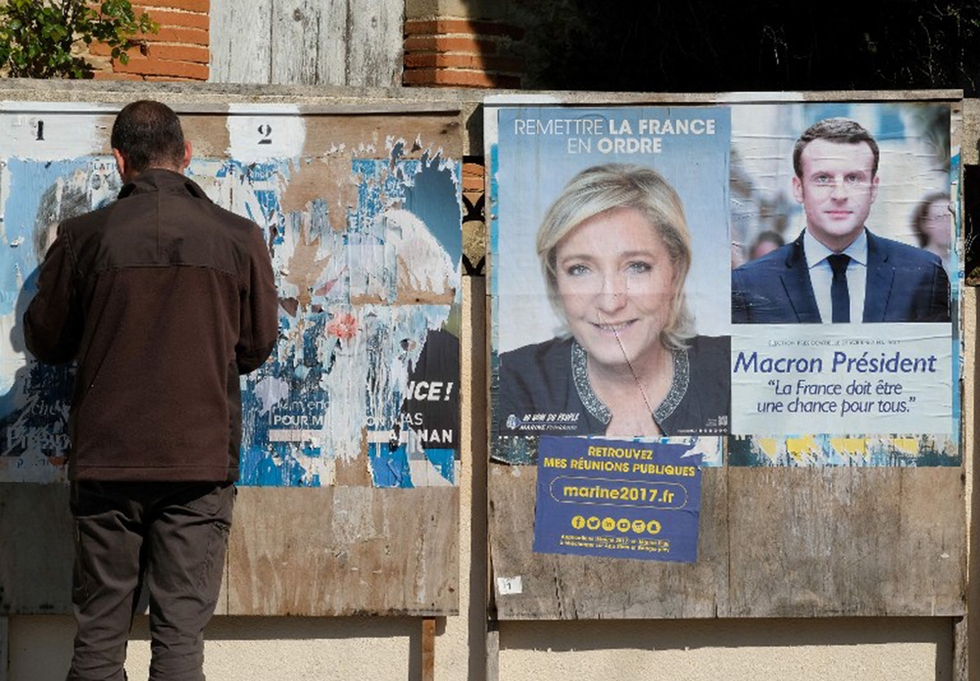
TOULOUSE, France - The accepted logic is that far-right candidate Marine Le Pen needs a perfect political storm to win the French presidency in Sunday's election.
She trails her youthful centrist rival Emmanuel Macron by 20 percentage points, according to the latest polls and Wednesday's fierce and bitter debate seems to have done little to narrow the gap.
The prevailing assumption is that a broad majority of voters – a so-called Republican Front that includes the poor and the vast majority of French Muslims – will support Macron, 39, to keep Le Pen, who many consider a fascist, out of the Elysee Palace.
But in southwest France, from the cosmopolitan city of Toulouse to the sun-drenched vineyards, medieval towns and bucolic hills of Tarn-et-Garonne department, there is just a glimpse of a possible political upset that could see the once solidly left-wing region vote for Le Pen, or not vote at all.
France today is a nation shaped by generations of sluggish economic performance, growing nationalist sentiment and more recently, the spectre of a series of deadly al-Qaeda- and Islamic State-claimed attacks that have pitched the country into a state of emergency.
Le Pen, 48, hopes to take advantage of this malaise by firing up a fury against her centrist rival and discouraging left wingers from voting. If this works, and she reaches enough of the estimated 18 percent of undecided voters, then she could yet make the election a close contest.
Toulouse, the so-called Pink City of Spanish influence and high-tech aerospace manufacturing, voted for far-left candidate Jean-Luc Melenchon in the first round, but now Macron's supporters fear those voters will stay away on Sunday, or, even worse, opt to vote for Le Pen.
Earlier this week there was even a "Ni Macron, Ni Len Pen" demonstration of about 100 socialists in the city's Place Du Capitole. Watching that demonstration was 18-year-old student journalist Manon Louvet, who will vote for the first time on Sunday.
"There are many students in Toulouse who voted for Melenchon in the first round who feel this way [and might not vote]," she told Middle East Eye.
"Macron is the choice to fight against the National Front in the second round, so I will vote for Macron, even though I'm not in agreement with him. But I hold my principles and my convictions. I don't take my vote lightly."
'I will wear thick gloves'
Remi Pradalier, 24, a paralegal who is looking to join the French civil service shares a similar view. Sitting in a trendy bar in a student area of the city, he is bleak about the state of France and the need to defeat Le Pen, in spite of his sadness at Melenchon's defeat.
"I cried last week. France is divided between the city and countryside and east and west, and this election has not solved that," he said.
"There is no real ideology in France anymore. A Le Pen victory on Sunday would be catastrophic though; she is surrounded by fascists and they will be emboldened. I will vote for Macron, but I will wear thick gloves."
Unlike Pradalier, Nicolas Martinelli, a 28-year-old who works for an estate agency, is the sort of Melenchon voter that Macron's team needs to worry about.
"I am not convinced I can vote for Macron on Sunday. All along I have been an anti-fascist, but the media has been tight with Le Pen and the far-right. Only now is the establishment painting itself as anti-fascist. I feel blackmailed by that."
Martinelli worked as a local organiser for Melenchon - a veteran socialist who many compare with British opposition leader Jeremy Corbyn - and worries that Macron may not be radical enough, especially his plans for labour reform.
"Both Macron and Le Pen are enemies in the long term. I will have to fight whoever gets elected."
He added: "Macron is planning the same neo-liberal politics as Hollande, Sarkozy and Chirac. We have seen how catastrophic that is. People are tired and we have seen them turning to fascism."
Melenchon himself has refused to explicitly back Macron, saying it is not his place to make decisions for his supporters. However, on YouTube last Friday, he told his supporters: "Is there a single person among you who doubts the fact that I'm not going to vote for the Front National? Everyone knows."
Nadjib-Slim Zenine, 24, another student from Toulouse, watched that video. He said there were many concerns about Macron, including his plans to use powerful presidential decrees to bring forward employment reform, but feels he has to vote for him on Sunday.
"The real question of this election is whether Melenchon's voters are willing to risk the accession of Le Pen to the presidency by not voting or spoiling their ballot, just to be in accordance with their political beliefs."
'Le Pen is trying to pull us apart'
Elsewhere in Toulouse though, Macron's support seems more clear cut, and in the wealthy suburb of Blagnac, where Airbus is based and English and German are just as likely to be heard in the markets as French, most voters are for Macron and are fearful of Le Pen's divisive politics on Islam, the European Union and nationalism.
Mohammed, a 40-something French-Algerian catching the modern tram to the centre of town from Blagnac, is positive about Macron.
"He is young with fresh ideas and is good for France. His programme is excellent. We need jobs, and he has many strong economic points."
Mohammed, who has lived in France most of his life after coming to Toulouse as a teenager, added that the "atmosphere against Muslims" since the Paris attacks won't put him off voting or speaking his mind,
"I am honoured to be French," he said. "Le Pen is trying to pull us apart."
Back in the centre of Toulouse, Macron has worked hard to attract French Muslims, said Mickael Nogal, the centrist's main organiser in the Haute-Garonne region. "Macron speaks in inclusive language," he said, as he handed out flyers to early morning commuters.
"Toulouse is a European, multicultural city and Macron understands that. He doesn't care about age or race or religion. I was in Toulouse during the 2012 attacks and in Paris for Charlie Hebdo and the Bataclan and I saw Macron's response. He has a global vision."
Security certainly is a key concern in Toulouse, where France's latest wave of political violence started in 2012 when a young French-Algerian man gunned down soldiers in Montauban, and then Jewish children in Toulouse. In total the attacker, Mohammed Merah, claimed eight lives, including his own, and left the city reeling.
Five years later, well over 200 people have been killed by terrorism across France and the country remains in a state of emergency.
Police have said their biggest concern during the election period is that of a potential lone act, similar to that on the Champs Elysees two weeks ago when a man armed with an automatic rifle shot dead police officer Xacier Jugele, and wounded two of his colleagues.
In Paris alone, more than 9,000 police, gendarmes and soldiers will be on duty and have been authorised to stop and search vehicles and pedestrians to conduct identity checks, while in Toulouse heavily armed police and troops are a common sight in the city centre.
Beyond the city's ring road in Mirail, a poor and largely French-Algerian suburb, the police presence is far lighter. Here, the social housing blocks still carry the scars of arson attempts and the bright-red Melenchon posters are starting to fade. There are stories of police refusing to come here and describing it as a "sensitive neighbourhood".
Noor, 23, a French-Algerian student, said she feared little would change on Sunday. "Nobody represents us. All we hear about is Islam and terrorism, but politicians never come here to see us. The people here need jobs, that's the real state of emergency."
In poor suburbs like this across France – where millions of first and second-generation Arab and African immigrants live, unemployment is often more than 50 percent, far higher than the national average of 10 percent. Life is already hard, but for French-Algerians like Mohammed and Noor, a Le Pen victory would be a disaster.
Le Pen once described Muslims praying in the street as being akin to the Nazi occupation and has regularly taken aim at halal food, the veil and the burkini, among many other aspects of Muslim culture.
And most worryingly for some, she has openly discussed deporting all foreigners on a terror watch list, regardless of whether a crime has been committed.
It's not surprising that in the last election in 2012, nearly 90 percent of French Muslims voted for Hollande over the National Front and the right-wing incumbent Nicolas Sarkozy.
Venomous debate
On Wednesday, Macron, the former banker, and Le Pen, the far-right figurehead, faced off in a venomous televised debate, which saw personal insults hurled as the two clashed over how to counter Islamic extremism.
The question for those watching in southwest France was whether Le Pen could pull it off. The shocks of Brexit and the election of Donald Trump played on many people's minds, amid fears the polling could be wrong.
Thankfully for Macron, French polling has been more reliable, but in the centre of Toulouse his supporters are still worried.
And Le Pen appeared to score some points lambasting him on his record as economy minister in the Socialist government - a post he quit to form his En Marche! movement.
In Montauban, a quiet medieval town an hour's drive north of Toulouse, that argument and her full-frontal attack on Macron seems likely to have some impact.
"We need a change. Something radical, as nothing has got better here. It has only got worse," said Agnes Noyant, a waitress in one of the town's seemingly thriving cafes.
"I might vote Le Pen on Sunday, and so might a lot of people around here. We need France to be great again. It has changed too much."
The villages around Montauban are dominated by Le Pen posters and the area voted for the far-right in the first round, but there is also a sizeable Muslim population and a discreet mosque sitting less than 200 metres from the town's 11th-century church.
Ironically the region, along with the rest of southwest France, has a long and proud history of accepting refugees and new arrivals, from socialists fleeing Franco's Spain and civilians fleeing the Nazi onslaught in the hot summer of 1940 to "Pied Noir" French colonialists who fled Algeria when French rule came to an end.
Southwest France was also home to internment camps and Jews were dispatched from Toulouse and elsewhere by French police to Nazi concentration camps.
Back in Toulouse, Nogal, the hard-working Macron organiser, who is himself half-Spanish, is quick to point this out.
"My parents came here to escape Franco and fascism. My fear is that by voting for Le Pen, some people are forgetting the past, forgetting our history here," he said.
"I think we will win, but of course, I'm sad. We need to fight extremism, not vote for it."
New MEE newsletter: Jerusalem Dispatch
Sign up to get the latest insights and analysis on Israel-Palestine, alongside Turkey Unpacked and other MEE newsletters
Middle East Eye delivers independent and unrivalled coverage and analysis of the Middle East, North Africa and beyond. To learn more about republishing this content and the associated fees, please fill out this form. More about MEE can be found here.


